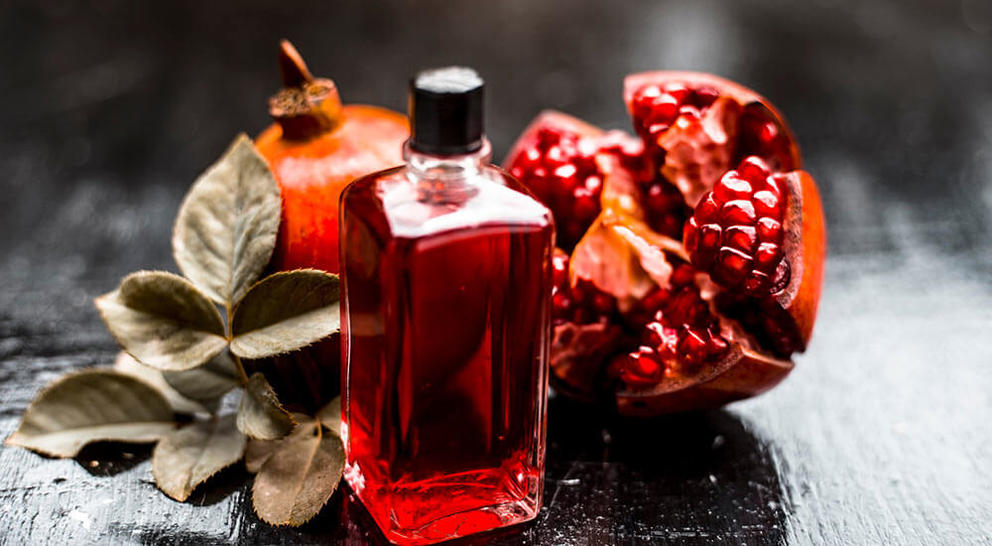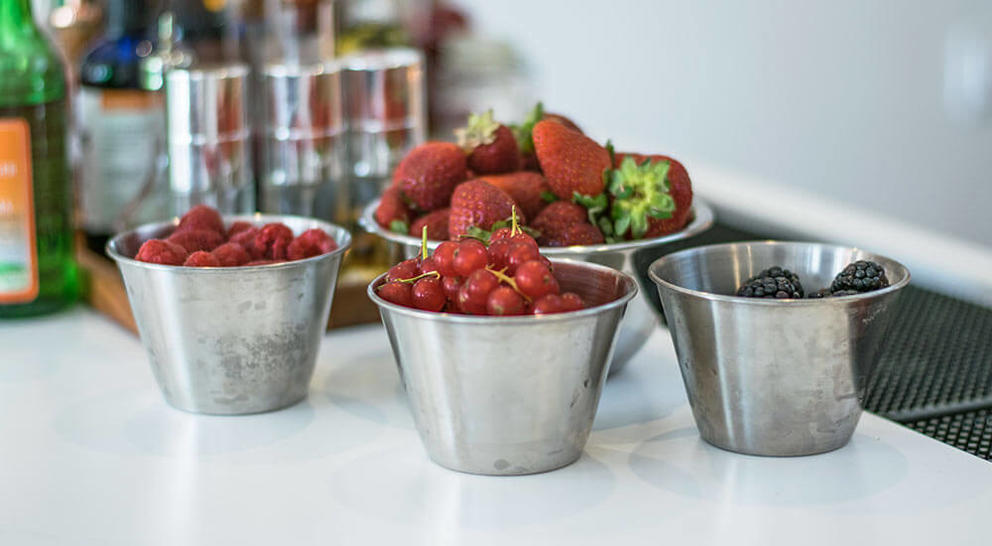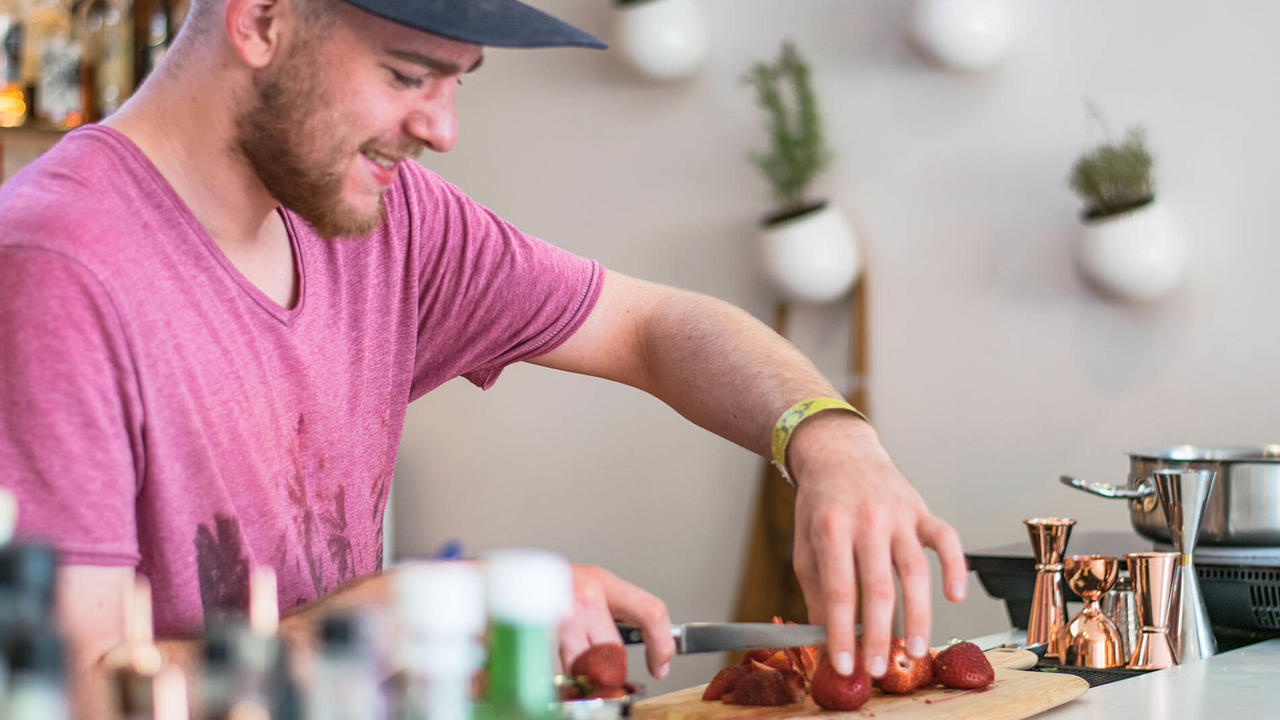There's no better way to show off your bartending skills than by being able to produce your own syrups and liqueurs. It will impress both your employer and your clients, and it's a nice added skill to enhance your CV. One of the best-kept bartending secrets is that they're not as complicated to make as you might think or have been told.
If you want to learn more about how to become a bartender or improve your skills check out our range of bartending courses from beginners to even advanced bartenders.
When making homemade syrups and liqueurs, matching the flavours to the seasons is always a winner. There's nothing more comforting on a cold winter's day than a coffee or cocktail flavoured with a dash of cinnamon or ginger syrup, and summertime beverages just get better with the addition of refreshing, fruity syrups.
Being able to serve up a liqueur that matches the climate or a seasonal celebration is a big plus too, and once you've mastered the basic methods, you can experiment by adding your own twist and creating your personal combinations. The beauty of making your own alcohol or syrup is that there are no limits to what you can make, but do bare in mind that the process can take some time. Flavours in liqueurs don't infuse overnight; they can take a couple of weeks or more to develop fully so you'll need to think and plan ahead.
Start Simple
Master making a simple bar syrup and you're halfway there. Simple bar syrup can be used as a sweetener to take the acidic edge off a cocktail mix, or it can be used to enhance a drink by adding subtle flavours that complement the other ingredients.
All you need to get started is water, sugar and a bottle. A simple syrup requires equal amounts of water and sugar, and you can whip it up in minutes behind the bar with no special utensils. Choose your measure, whether it be a cup, glass or a cocktail shaker. Add one measure of sugar and one measure of water to the bottle. A small plastic funnel really comes in handy for this. Put the top on and shake the bottle until the sugar has dissolved. Using hot water makes the whole process a lot quicker, but if you haven't got access to any, don't worry, the end result will be exactly the same, you'll just have to work a bit harder to get there.
Spice It Up

Simple bar syrup can be easily enhanced by adding ingredients that you’ll find in any kitchen and bar. One of the most useful mixes to add to your syrup is lemon and lime juice. Add a half a measure of each, and you'll have a sour mix you can use in margaritas, mojitos or basically any drink that calls for the addition of a citrus flavour. Store the syrup in the fridge and it'll keep for a couple of weeks – that’s if it lasts that long!
When you're ready to whip up a syrup of your own concoction that will tickle the taste buds of your client's palette, you'll need access to a stove. Brewing flavours like ginger with black pepper, vanilla with chilli, or when using fresh fruit, all need heating, so the flavours can steep and infuse into explosive taste sensations. They're still easy to make though and take next to no time at all.
For these types of syrups, commonly known as rich simple syrups, it's better to use two measures of sugar to one of water. Put the sugar and water in a saucepan and heat. Once the sugar has dissolved, it's time to throw in those extra ingredients and let them bubble away gently for between ten to fifteen minutes. Don't leave your brew unattended or you'll end up with toffee. When the time's up, take the pan off the heat, pop a lid on it and leave it cool. The flavour will develop as it cools. After an hour or so, have a quick taste, then pour it into a bottle. Some ingredients, like ginger, you won't want in the finished product so pour the liquid through a sieve as you're bottling it.
Lovely Liqueurs
Once you've had some practice creating syrups, it's an easy progression to start making homemade liqueurs. If you're planning on doing it at work, it's a good idea to make sure the manager or boss is happy for you to use the bar's spirit supply first.
Two classic liqueurs that are easy to make are Limoncello and Cherry Brandy.
For the Limoncello you'll need:-
200ml Water
4/5 Lemons
Bottle of Vodka
200g Sugar
Storage Jar
Bottles
Peel the zest from the lemons - that's the yellow part of the skin with as little of the white pith beneath it as you can manage. Then squeeze the juice from the lemons and set it aside. Pour the sugar and the water into a pan and heat until the sugar dissolves. Let it reduce a little before taking it off the heat. Once it's cooled slightly, stir in the lemon zest and juice, then pour the mix and the vodka into the storage jar. Close the lid, give it your best cocktail shaker manoeuvre and hide it away in a cupboard somewhere for three to four weeks after which it'll be ready to bottle and drink.
Cherries make great liqueurs, and Cherry Brandy is a lovely, soothing winter warmer.

To make some, you'll need:-
1 Kilo Cherries
300g Sugar
Bottle of Brandy
Storage Jar
Bottles
You can use either fresh or canned black cherries for this liqueur, whichever you find the easiest. Opting for canned cherries is great as you don't need to remove the pits, which can be a fiddly and messy job. Drop the fruit in the storage jar, pour the sugar in, followed by the brandy. Pop the lid on and shake the jar. It'll be ready to try after four weeks in a dark place. You'll need to give it an extra shake now and then to help the cherry flavour to infuse with the brandy. When it's ready, strain it through a sieve into a large jug then decant it into bottles. Serve the cherries with the liqueur or use them as tasty cocktail decorations.
Whatever you decide to make, it's guaranteed to be doubly delicious because it’s homemade.
If you like the idea of making your own ingredients or spirits at home, why not read How to Make Vermouth (and Other Stuff You Need to Know About the Drink!).

